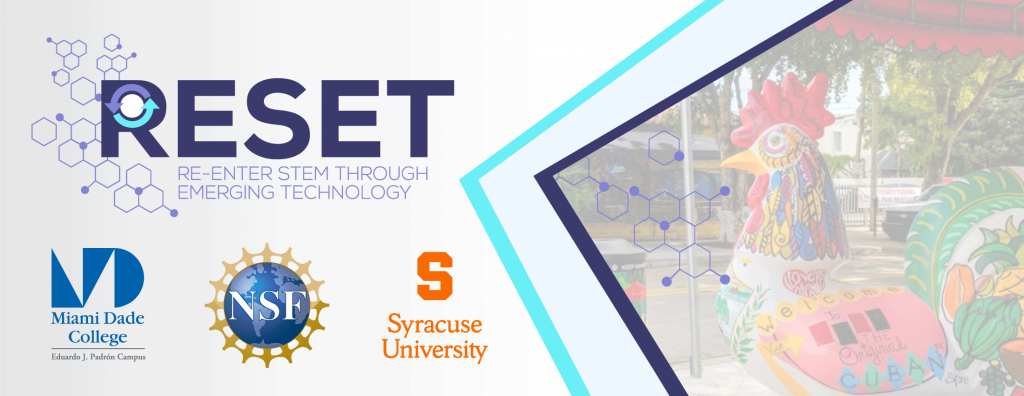
Call for Participation
Scope
Research suggests that women drop out of academic programs and leave the workforce to care for their families, financial setbacks, personal obligations and call to active duty program. Some niches within the STEM field, like Emerging Technology (EmTech) fields (e.g. cloud computing, mobile application, machine learning, data science, cybersecurity, virtual reality/augmented reality, internet of things, and robotics), are expected to grow job opportunities more quickly than others. The demands of these jobs can only be fulfilled by creating opportunities for one of the largest untapped STEM talent pools, which is returning women. To understand the barriers and challenges faced by returning women to enter STEM (especially EmTech) education and career path, the RESET (Re-Enter Stem Through Emerging Technology) conference will facilitate a gathering of national experts and students to advance the current state of knowledge on what will support returning women to re-enter the education and professional pipeline, especially after a career break. This conference solicits quality papers in topics including, but not limited to:
- Approaches to new career pathways in EmTech fields
- Experience report on (re-)entry into computing/EmTech fields
- Strategies to navigate computing career pathways and to (re-)enter the computing/EmTech workforce
- Unique challenges in (re-)entering computing/EmTech fields
- Unique challenges entailed in (re-)entering computing/EmTech academic programs when switching from another discipline
- Unique challenges entailed in (re-)entering computing professions when switching from another career
- Role of boot camps or informal learning in enabling (re-)entering in computing/EmTech academic programs and professions
- Internships, accelerated training and industry partnerships
- Curricula Initiatives and practical learning experience reports
- Policy redesigns for easier (re-)entry into computing/EmTech fields
There will be NO REGISTRATION COST to attend or participate at the conference.
Types of Submission
Panel
A panel is a discussion among nominated panelists on a specified topic, typically occupying a 90-minute session, with at least a third of that time allocated for audience participation. The detailed description of the proposed session must not exceed 2 pages for all text, figures, and references in PDF format. Panel submissions must include:
– a title and an abstract (up to 250 words)
– there has to be at least one moderator and three to four panelists
– organizer(s) Information (name, email, affiliation)
– a short bio for each panelist
– a statement of the panelists’ qualifications
– the motivation for having each panelist or workshop co-leader
– the target audience (e.g., faculty, administrators, undergraduate students, graduate students, etc.), and
– a detailed description of the proposed panel
Download the panel template
Workshop
Workshops are interactive session with a presenter-lead, structured training followed by in-depth discussions, exercises, or problem solving. We invite industry professionals and scholars from the academia to submit hands-on virtual workshop for students to gain various technical skills. Workshops will be typically occupying 45 min to 60 min. The proposed session must not exceed 2 pages for all text, figures, and references in PDF format. A proposal must include:
– Workshop Title and an abstract (up to 250 words)
– Workshop Facilitator'(s) Information (name, email, affiliation)
– a short bio for each Workshop Facilitator
– a statement of the workshop Facilitator’ qualifications
– a detailed technical description of the proposed workshop
Download the workshop template
Poster
The research poster session provides an opportunity for students to present their latest work to a wide conference audience and to network with peers and experts in their research area. Posters are appropriate for work in progress, preliminary results, and late-breaking research results. If your poster submission is accepted, it will be displayed for a 1-hour time period. The research abstract should describe: the research problem and motivation, background and related work, approach and uniqueness, results, and contributions. Your poster proposal must include the following:
– Poster title and names and affiliations of the author
– 1-page abstract and must not exceed 1 pages for all text, figures, and references in PDF format
– The presented poster will be judged by the attendees of the conference and the top 3 posters will be given best poster award
Download the poster template
Research Paper/Experience Report
Papers or reports presenting interesting results that are in line with the conference scope are welcome. Papers in the format of experience reports describing an innovative approach and an assessment of its impact, and projects undertaken to investigate aspects of EmTech education are also welcome. Papers describing beliefs or proposals for future work in facilitating (re-)entry of women are highly welcome. Paper submission can be up to 6 pages (single column) or 4 pages (double column) and typically the duration of the paper presentation is 45 min. The submission must include the authors’ names and affiliation. The presented papers will be judged by the attendees of the conference and the top 3 papers will be given best paper award.
Download the paper template
Submission Guidelines
All submissions will be peer-reviewed, however, the accepted submissions (in any category) will NOT be published with any publisher or in the digital library. You are welcome to submit research papers published at other conferences that fit the scope of the RESET conference. Be sure when making a submission that all authors are included.
Submission Instructions
Easychair will be used to accept electronic submission. All submissions must be PDF files.
Important Dates
Submission Open: Sep 7, 2020
Submission Due: Nov 20, 2020
Author Notification: Dec 15-Dec 18, 2020
Final Submission: Jan 4, 2020
Contact Us
For questions regarding submissions please contact the organizers

Partial support for this work is provided by the National Science Foundation Inclusion across the Nation of Communities of Learners of Underrepresented Discoverers in Engineering and Science (INCLUDES) program under Award No.1953431and 1932662. Any opinions, findings, and conclusions or recommendations expressed in this material are those of the author(s) and do not necessarily reflect the views of the National Science Foundation.
